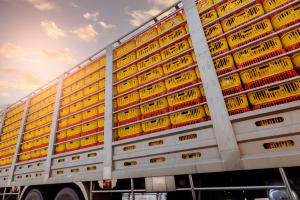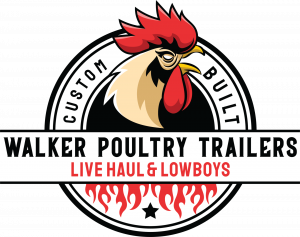Poultry Hauling Made Safer with Balanced Trailer Weight Strategies
The Challenges of Live Poultry Transport
Transporting live poultry poses unique challenges. Unlike stationary cargo, live poultry loads are dynamic, with birds shifting and moving during transport. This movement can exacerbate imbalances in the trailer, affecting handling, stability, and safety. Trailers with improperly distributed weight can place excessive stress on axles, tires, and suspension systems, leading to mechanical issues and costly repairs.
“Proper weight distribution is not just about extending the life of the equipment,” says Walker. “It directly impacts the safety of drivers, the well-being of the poultry, and the overall efficiency of the operation.”
Trailers designed with weight distribution in mind help minimize these risks by ensuring loads are evenly distributed across the trailer and vehicle. This reduces the strain on critical components and promotes smoother, safer transport.
Safety on the Road
Safety is a primary concern in live poultry transport. Trailers with uneven weight distribution can cause swaying, poor braking performance, and difficulty in steering. These issues not only increase the likelihood of accidents but also put drivers and other road users at risk.
Balanced loads reduce the chances of trailer instability, especially during sharp turns or sudden stops. A well-distributed load ensures that the trailer remains level and stable, improving overall control for the driver. In states like Alabama, Georgia, and Texas, where poultry production operations often require long-distance transport on highways and rural roads, stability is especially crucial.
Protecting Poultry Welfare
The well-being of live poultry during transport is another key factor influenced by weight distribution. Poorly balanced trailers may result in uneven airflow, temperature fluctuations, and stress for the birds. Ensuring even weight distribution helps maintain a stable environment inside the trailer, reducing stress and improving the overall welfare of the poultry during transport.
“Maintaining a stable load is about ensuring the birds arrive at their destination in optimal condition,” explains Walker. “The welfare of the poultry directly impacts the efficiency and outcomes of the production process.”
Cost Efficiency and Equipment Longevity
For poultry companies, cost efficiency is a top priority. Imbalanced loads can increase fuel consumption as the towing vehicle works harder to compensate for uneven weight. Over time, this leads to higher operating costs.
Additionally, uneven loads place unnecessary strain on tires, axles, and suspension systems, accelerating wear and tear. Regularly transporting improperly distributed loads can significantly shorten the lifespan of trailers and increase maintenance expenses.
Trailers specifically designed for live poultry transport take these factors into account, with features that promote even weight distribution. By reducing wear on critical components, these trailers help companies lower long-term maintenance costs and maximize the value of their investment.
Designing Trailers for Optimal Weight Distribution
Poultry live haul trailers are engineered to address the unique demands of transporting live animals. Features such as evenly spaced axles, reinforced flooring, and adjustable compartments help ensure that weight is distributed evenly throughout the trailer. Properly positioned ventilation systems further enhance airflow, creating a more stable environment for the poultry.
Trailers designed with weight distribution in mind also support compliance with transportation regulations, including weight limits and axle load requirements. Operating within these guidelines is essential for avoiding fines and delays during transport.
Targeting the Needs of Poultry Producers
Poultry production is a cornerstone of agriculture in states like North Carolina, Mississippi, and Arkansas, with millions of birds transported daily. Efficient transport systems are essential for supporting the industry's demands and maintaining its competitive edge.
By prioritizing trailers that balance loads effectively, poultry companies in these regions can improve safety, protect their equipment, and enhance productivity. Investments in quality live haul trailers reflect a commitment to the safety of drivers, the welfare of poultry, and the sustainability of operations.
Moving Toward Safer and Smarter Transport
Balancing loads in poultry trailers is a foundational step toward safer and more efficient live poultry transport. Proper weight distribution ensures the stability of trailers, reduces risks on the road, and minimizes wear and tear on equipment. These benefits extend to the welfare of the birds, the efficiency of operations, and the bottom line of poultry producers.
Dwayne Walker concludes, “Focusing on weight distribution is about creating a smarter, safer, and more sustainable approach to live poultry transport. Every load that moves safely and efficiently benefits not just the poultry companies but the entire industry.”
Morgan Thomas
Rhino Digital, LLC
+1 504-875-5036
email us here
Visit us on social media:
Facebook
Legal Disclaimer:
EIN Presswire provides this news content "as is" without warranty of any kind. We do not accept any responsibility or liability for the accuracy, content, images, videos, licenses, completeness, legality, or reliability of the information contained in this article. If you have any complaints or copyright issues related to this article, kindly contact the author above.


